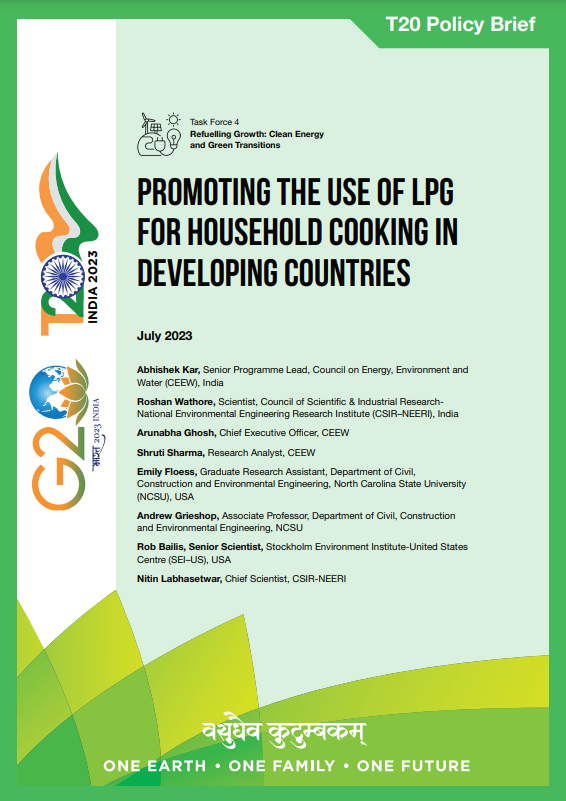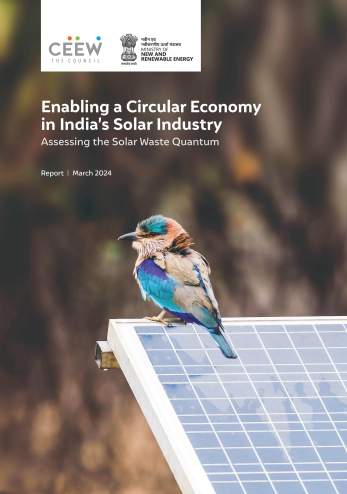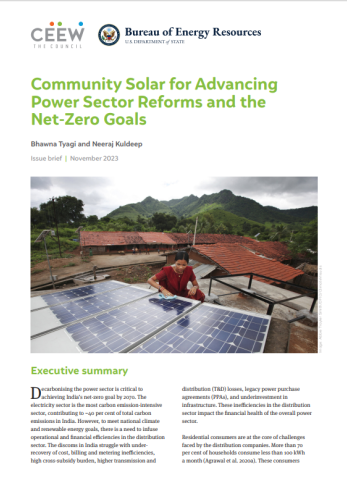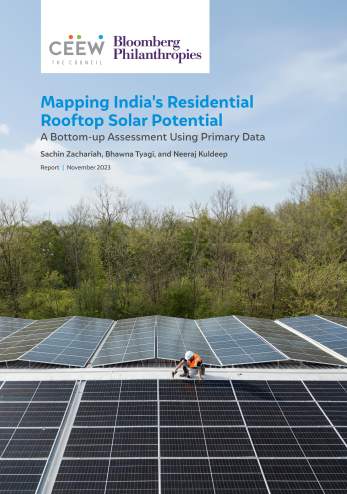Policy Brief
Promoting the Use of LPG for Household Cooking in Developing Countries
Abhishek Kar, Roshan Wathore, Arunabha Ghosh, Shruti Sharma, Emily Floess, Andrew Grieshop, Rob Bailis, and Nitin Labhasetwar
July 2023 | Energy Transitions
Suggested citation: Kar, Abhishek, Roshan Wathore, Arunabha Ghosh, Shruti Sharma, Emily Floess, Andrew Grieshop, Rob Bailis and Nitin Labhasetwar. 2023. Promoting the Use of LPG for Household Cooking in Developing Countries. T20 Policy Brief.
Overview
This Policy Brief delves into the net climate benefits of scaling up Liquefied Petroleum Gas (LPG) in developing countries as an interim solution to aid the transition away from solid fuels. About 2.4 billion people continue to cook with solid fuels including firewood, charcoal, and biomass. LPG is seen as a scalable transitional cooking solution until renewable alternatives are ready for the market. However, consumers in the Global South face an affordability barrier to switch to primary use of LPG amidst a high inflationary environment.
Key Highlights
- Over 2.4 billion people rely primarily on traditional, polluting (solid) fuels and technologies to meet their cooking energy needs. Cooking with solid fuels delays the progression of multiple UN Sustainable Development Goals (SDGs), including Goal 3 (Good health and wellbeing), Goal 5 (Gender equality), Goal 7 (Affordable and clean energy), Goal 13 (Climate action), and Goal 15 (Life on land).
- Inaction on issues related to health, gender, climate change, and the environment has a yearly cost of USD 2.4 trillion, of which USD1.4 trillion is related to health, US$0.8 trillion is related to lost productivity for women, and USD 0.2 trillion is related to climate change.
- There is a greater risk of affordability issues driving back solid fuel dependence for an estimated 100 million people who had already transitioned to clean cooking fuels.
- An annual investment of USD 150 billion in Modern Energy Cooking Services (MECS) is estimated to provide universal access to clean cooking fuel. This represents a fraction of the overall cost to indicators of health, gender and the environment.
- Apart from being a highly scalable interim clean cooking solution, cooking with LPG also presents net climate benefits as compared to firewood. Cooking with one 14.2 kg LPG cylinder saves 176 kg of firewood burning. Moreover, according to current carbon credits trading norms, a discount of upto USD 1.78 (INR 147) can be offered to end customers per 14.2 kg LPG cylinder.
Recommendations
- Facilitate knowledge-sharing and capacity building efforts: The G20 can support countries with populations that lack access to clean cooking energy and have a high fraction of non-renewable biomass (fNRB) by providing roadmaps and best practices for Global South nations interested in upscaling LPG for cooking.
- Aggregate an information repository: The G20 can support the development of an information repository for calculation of optimal subsidy for nations interested in driving primary and exclusive use of LPG, accounting for their purchasing power, export dependence and unique requirements, among other factors.
- Engage with Organisation of the Petroleum Exporting Countries (OPEC): In order to combat the high inflationary environment and price shocks of international fluctuations, the G20 can negotiate for the extension of volume-based discounts, price guarantees to buffer against external shocks, and other price stability mechanisms to G20 nations that present a huge consumer base to the OPEC.
- Determine the carbon credits accrued from emissions reductions: The ‘Technologies and Practices to Displace Decentralised Thermal Energy Consumption’ (TPDDTEC) methodology can be used to account for emissions reductions in switching over from non-renewable biomass to a mature and scalable technology like LPG.
- Extend infrastructural and financial support: The G20 can establish a fund to extend financial support to Global South nations in the form of results-based financing and other avenues of viability gap funding.
"The transition from solid fuels to LPG, despite being a fossil fuel, could result in a 74-percent reduction in net climate effect."







